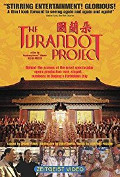
Directed by
Alan Miller
Rated G
Reviewed by
Ruth Williams

Turandot Project
Synopsis: Zubin Mehta is the musical director and conductor of the latest production of the Puccini opera, Turandot. As the story is set in ancient China , he decides to invite the renowned Chinese film director, Zhang Yimou to direct the opera. He felt this would add a level of authenticity that had not been achieved in previous versions. They stage their first production in Florence in 1997. One year later, they pull off an extraordinary performance of the same opera in The Forbidden City of Beijing. This documentary reveals the close collaboration between the two men, as well as the many obstacles that are inevitable in the creation of such a grand event.Alan Miller first heard of the existence of this collaboration while shooting a documentary on the Chinese composer Zhao Jiping. Jiping composed the music for many of Zhang’s films, including Red Sorghum(1987) and Raise the Red Lantern (1991). Zhang had never directed opera before, however once it was clear that he would be responsible for the look and that Mehta would take charge of the music, he felt comfortable with their clearly defined roles. It is the strength of the mutual respect they held for each other that carried them through the days when things didn’t always fall in to place.
In his role as a film director, Zhang Yimou had become accustomed to being in charge. He was soon to discover that things didn’t work the same way in the staging of an opera. It seems the head of each department expected to have the final say, and this did not sit well with him. This issue is complicated even more once they arrive in Beijing, where he feels he has a responsibility to bring honour to the Chinese. It is not long before different cultural views cause friction. To the merit of all involved, they do manage to negotiate and compromise, although the Italian lighting designer, Guido Levi, feels he is the one doing all the compromising.
By following the performance as it is relocated from Florence to Beijing, Miller introduces us not only to the world of opera, but also to The Forbidden City. The building chosen as the backdrop was built in 1420 and permission for the staging of the opera is based on the assurance that none of the old buildings will be damaged. Zhang’s insistence that costumes be based on styles from the Ming Dynasty at first seems excessive; but of course it is no different to any Western director insisting on period verisimilitude.
The staging of the opera attracted worldwide publicity with people flying in from around the world. Chinese audiences were generally thrilled to see the combination of the Western style of performance with the Eastern look. It can only he hoped that such ‘multi-cultural’ collaborations will be repeated, and not just in the field of opera.

Want more about this film?


Want something different?




